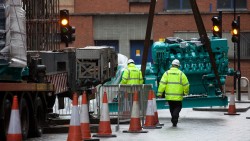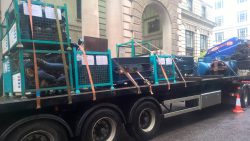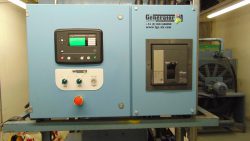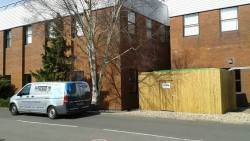Life safety Generator Control Panel and MCCB Panel upgrade for state of the art serviced offices at exclusive address in London
Customer: A reputable provider of Building Services Maintenance specialising in the operation of Mechanical and Engineering maintenance of landmark buildings in London for the private sector.
Project: Due to an existing long term relationship with the client, The Generator Company was contacted by the client to quote for design, build, supply and installation upgrade of the current out of date control panel and GCB panel, based on the roof, that is past its service life and failing intermittently.
The current control system supports several lifts and life safety equipment for state of the art serviced offices based in the prestigious Berkley Square, London. The building, built in the 1930’s, comprises of approximately 500,000 sq. ft. spread over fourteen floors. Berkley Square boasts a wonderful parade of 220-year-old London plane trees within the historic gardens and lays claim to previous residents of two Prime Ministers, Winston Churchill and George Canning and the birth place of HM Queen Elizabeth II.
The offices surrounding the square and those that are managed by the client include a number of hedge funds and wealth management businesses so given the nature of the residing businesses and the critical nature of the services provided the client cannot afford any down time.
Following a site survey of the existing panels, carried out by our project manager, to assess site conditions and any site constraints, a quote was issued to the client detailing the proposed design, full scope of works and schedule of installation for the upgrade project. The proposed generator control panel will incorporate a Deep Sea Electronics control module and will be designed to allow control as required by the seven existing site changeover panels.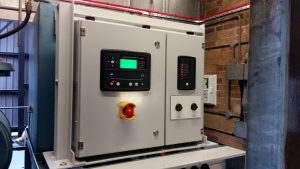
The Generator Company were delighted to be awarded the project and as with all our projects an experienced Project Manager was appointed to ensure that that the daily running of the project ran smoothly and all necessary drawings, health and safety documents and other associated aspects of the project were managed in an appropriate and timely manner throughout. This guaranteed that the customer had someone on hand whenever they were needed with 100% focus on the project.
The Deep Sea Electronics control module was designed and constructed in our designated control panel workshop in Rochester and bench tested to verify the operation of the control circuits. This test is to confirm that in the event that if any of the seven ATS panels experiences a mains failure, the generator will start to support the site.
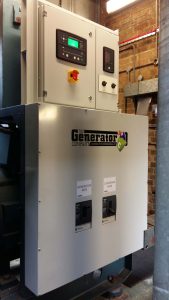
The GCB/Loadbank changeover switch, also constructed in our panel workshop, comprised x1 MCB designated as the generator circuit breaker and x1 MCB designated as the Loadbank circuit breaker. The GCB panel was tested in conjunction with the Deep Sea panel to ensure in the event of a mains failure the Loadbank circuit breaker shunted open to prevent the system being overloaded.
On the specified delivery day, one day prior to installation, all panels were delivered to site. Prior to installation, the generator was isolated and all ATS panels identified and isolated and subsequently disconnected and removed. A new control panel stand needed to be fitted due to the original being part being mounted to the side of the fuel tank.
The new control panel was fitted and connected. Once complete the original GCB was removed and the new GCB panel complete with Loadbank connection point was fitted.
Both stages of this project required completing over one weekend to ensure that there was no disruption to the building and residing businesses.
On completion of the installation a full building mains failure and building load test was successfully undertaken to check the correct operation of the new panels.
The Generator Company left site with an extremely satisfied client. All relevant documentation and operating manuals for the new equipment was left with the client as well as reports on the successful commissioning of the control system.
